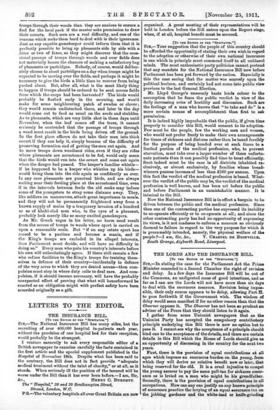To THE EDITOR OE THE "SPECTATOR. "] SIR,—Your suggestion that the
people of this country should be afforded the opportunity of stating their own wish in regard to the adoption or otherwise of their own national insurance is one which in principle must commend itself to all unbiased minds. The most enthusiastic party politician cannot pretend that any mandate for the National Insurance Bill now before Parliament has been put forward by the nation. Especially is this the case seeing that the matter was scarcely upon the political horizon, and certainly had not come into public view previous to the last General Election.
Mr. Lloyd George's unseemly haste lends colour to the assumption that he fears the public verdict in view of the daily increasing cries of hostility and discussion. Such are the feelings of a man who knows that " to take and do" is a more certain means of accomplishment than first to ask permission.
It is indeed highly improbable that the public, if given time properly to consider this Bill, would consent to its adoption. Few must be the people, few the working men and women, who would not prefer freely to make their own arrangements for times of sickness and distress rather than be taxed forcibly for the purpose of being handed over at such times to s limited portion of the medical profession, who, to prevent starvation, must take over a larger number of these unfortu- nate patients than it can possibly find time to treat efficiently. Such indeed must be the case in all districts inhabited ex- clusively, or almost exclusively, by families whose bread- winners possess incomes of less than £160 per annum. Upon this fact the verdict of the medical profession is based. What- ever the verdict of the public may be, the verdict of the medical profession is well known, and has been set before the public and before Parliament in an unmistakable manner. It is inimical to the Bill.
Now the National Insurance Bill is in effect a bargain to be driven between the public and the medical profession. Since then one of the contracting parties has expressed its inability to co-operate efficiently or to co-operate at all ; and since the other contracting party has had no opportunity of expressing its views, is it not madness to enforce a measure so obviously doomed to failure in regard to the very pus-pose for which it is presumably intended, namely, the physical welfare of the


















































 Previous page
Previous page